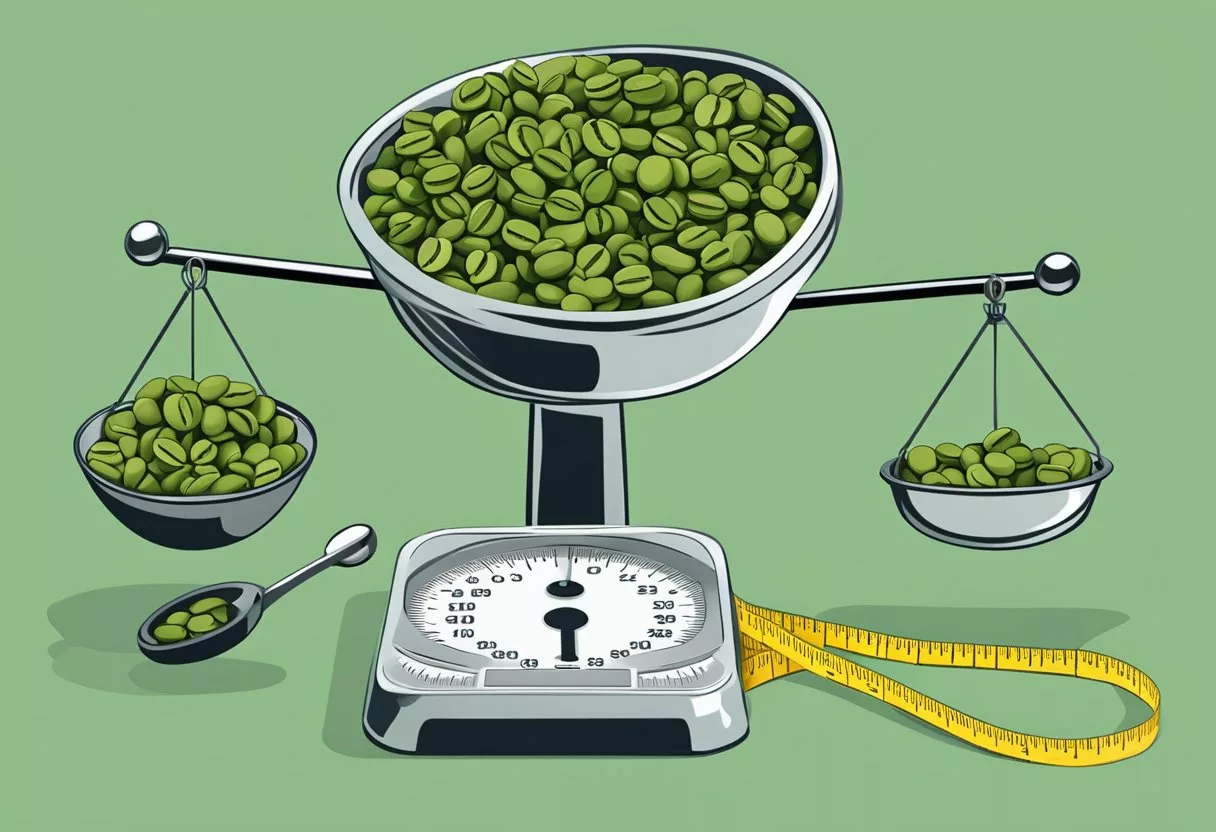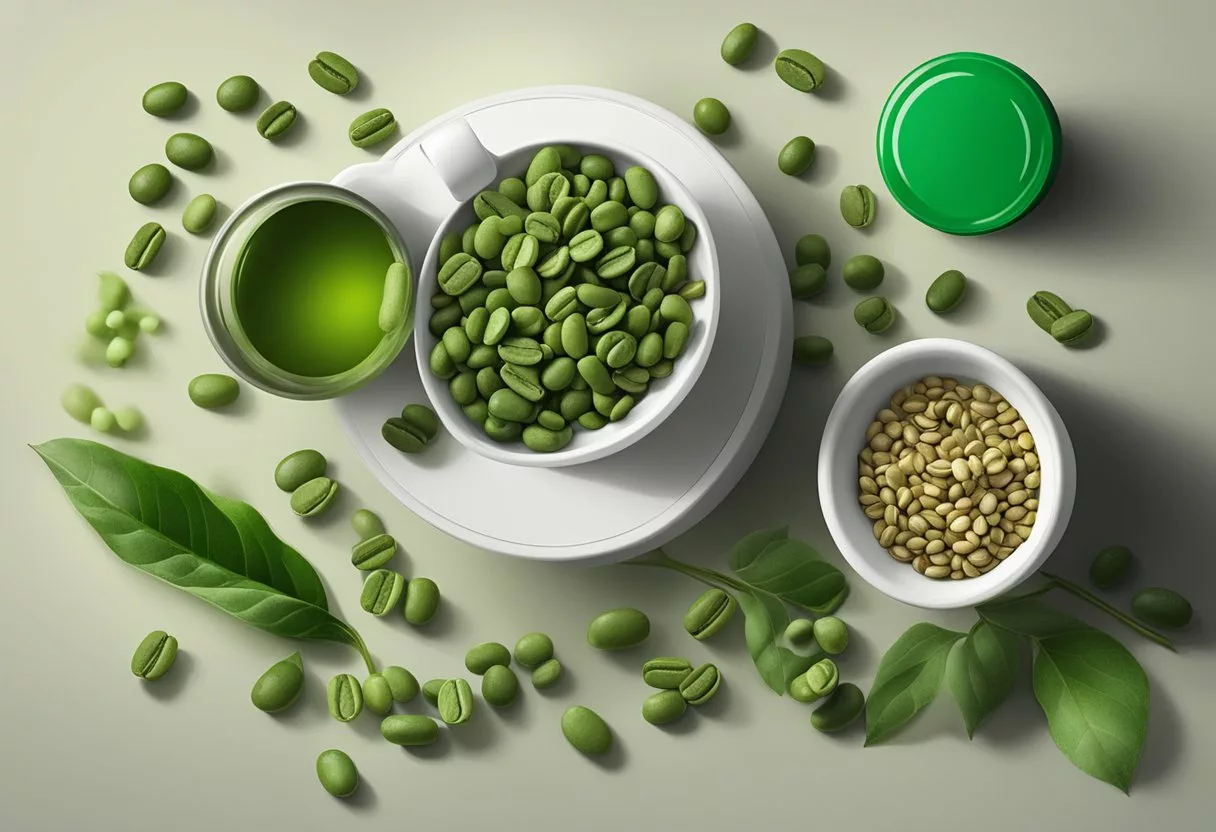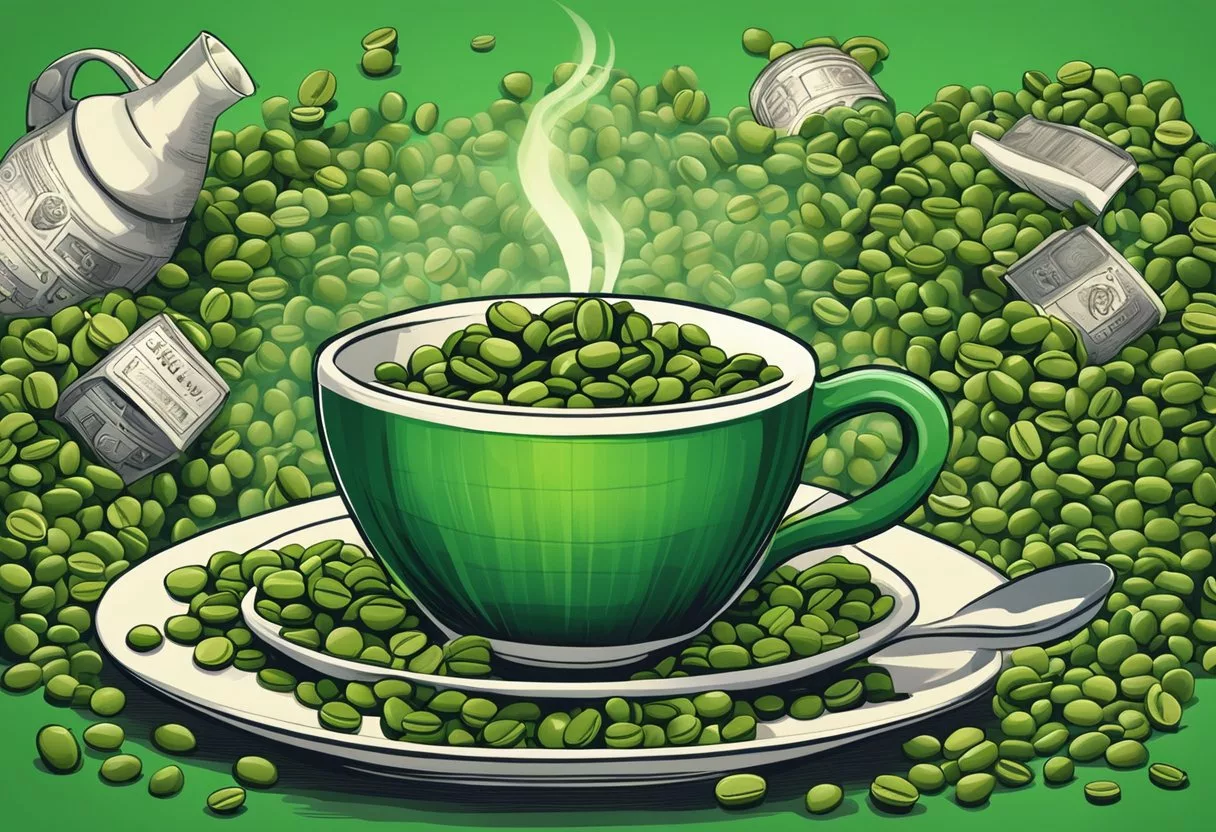Green coffee beans, unroasted seeds of the Coffea plant, have garnered attention in the wellness and weight loss communities. Unlike their roasted counterparts, green coffee beans retain a higher level of chlorogenic acid, a compound that is thought to have various health benefits including influencing weight loss. This compound is the cornerstone of green coffee bean’s reputation as a weight loss aid; it is believed to affect the body’s metabolism and the way it handles blood sugar.

Research into the efficacy of green coffee beans for weight loss is ongoing, but some studies suggest a potential for modest weight loss benefits. Chlorogenic acid is posited to play a key role by contributing to fat metabolism and the inhibition of carbohydrate absorption. Scientists are examining how this acid interacts with the body, looking for conclusive evidence of its impact on weight management.
While green coffee beans are emerging as a popular supplement, their effectiveness is not universally agreed upon within the scientific community. As with many dietary supplements, they are not a magic solution for weight loss but could potentially be part of a broader strategy that includes diet and exercise. It is critical for consumers to understand the current state of research and to consider the potential effects and safety of green coffee beans before incorporating them into a weight loss regimen.
Understanding Green Coffee Beans

Green coffee beans serve as the unroasted seeds that, upon heat treatment, transform into the aromatic beans used worldwide for coffee brewing. The distinct characteristics of green coffee beans and their alteration through the roasting process play a crucial role in defining their utility in weight management.
Defining Green Coffee Beans
Green coffee beans are the raw, unprocessed seeds of Coffea fruits before they undergo roasting. Unlike roasted coffee beans that are brown, green coffee retains its natural green hue and a higher concentration of chlorogenic acids, which are compounds with potential health benefits. The primary attributes of green coffee beans are:
- State: Unroasted
- Color: Green
- Content: High levels of chlorogenic acids
Given their unroasted state, they have a different flavor profile and chemical composition in contrast to roasted coffee beans.
The Roasting Process and Its Impact
The roasting process involves heating green coffee beans at high temperatures, which leads to chemical and physical changes. A table illustrating the transformation of coffee beans during roasting:
| Aspect | Green Coffee Beans | Roasted Coffee Beans |
|---|---|---|
| Flavor | Mild, grassy | Rich, bold |
| Color | Green | Varies from light brown to dark brown |
| Chemical Composition | High chlorogenic acids | Reduced chlorogenic acids |
| Aroma | Minimal | Enhanced, characteristic of coffee |
Roasting reduces the levels of chlorogenic acids, which is why green coffee beans are highlighted for their higher content. These acids have been studied for their potential influence on glucose metabolism and weight control. However, consumer expectations should be formed on the basis of substantive scientific evidence, ensuring that any weight loss benefits attributed to green coffee undergo rigorous scrutiny. The roasting degree ranging from light to dark ultimately influences the flavor, caffeine content, and acidity of the final coffee product.
Health Benefits of Green Coffee

Green coffee beans, unroasted and packed with chlorogenic acid, have garnered attention for their potential health benefits. Research has explored their role in weight management, blood sugar control, and overall wellness.
Weight Loss and Metabolism
Green coffee is popular as a weight loss supplement due to its chlorogenic acid content, which is thought to influence metabolism. Studies suggest that green coffee extract may reduce the absorption of carbohydrates from the digestive tract, which could lead to a modest weight reduction over time.
- Metabolism Impact: Positively influences metabolism, potentially aiding in weight management.
- Weight Reduction: May decrease carbohydrate absorption, contributing to weight loss.
Blood Sugar and Diabetes Management
Control of blood sugar levels is vital for diabetes management, and green coffee might play a supportive role here. Its effect on blood sugar metabolism could help stabilize glucose levels, although more research is needed to firmly establish these benefits.
- Blood Sugar Stability: Can assist in managing glucose levels, showing promise for diabetes support.
- Diabetes Risk: Early studies indicate a potential reduction in diabetes risk with regular green coffee intake.
Blood Pressure Reduction
High blood pressure is a common health concern, and green coffee may offer some remedy. Components in green coffee have been linked to lower blood pressure in individuals with mild hypertension.
- Blood Pressure Levels: May lead to improvements in individuals with elevated blood pressure.
- Hypertension Mitigation: Potential for green coffee to act as an adjunct treatment for hypertension.
Antioxidant Effects and Wellness
Green coffee beans boast high levels of antioxidants, which contribute to overall wellness. The antioxidant properties combat oxidative stress, which can lead to chronic diseases and aging.
- Oxidative Stress Reduction: Antioxidants in green coffee can reduce cellular damage from free radicals.
- Chronic Disease Prevention: Antioxidant effects may help prevent or delay the development of certain chronic conditions.
Green Coffee Supplements and Extracts

Green coffee supplements and extracts have gained popularity for their potential impact on weight management. These products typically offer a concentrated dose of the beneficial compounds found in green coffee beans.
Extract vs. Whole Bean Benefits
Green coffee bean extract is derived from unroasted coffee beans, retaining a higher level of chlorogenic acids compared to roasted coffee beans. Chlorogenic acids are thought to be the main active component that may influence glucose metabolism and fat accumulation.
- Green coffee extract: Offers concentrated chlorogenic acids, potentially enhancing its beneficial properties without the need to consume large quantities of beans.
- Whole bean: Consuming the whole bean can provide a more holistic blend of coffee nutrients, but in less concentrated amounts compared to the extract.
Efficacy of Supplements
When it comes to the efficacy of green coffee supplements, studies show mixed results. It’s crucial to differentiate between supplements that contain pure green coffee bean extract and those with additional additives:
Pure Green Coffee Bean Extract:
- Caffeine content: Typically lower than roasted coffee, potentially reducing unwanted side effects linked to high caffeine intake.
- Supplement form: May support weight loss efforts when combined with a balanced diet and exercise, though results can vary among individuals.
While green coffee extract supplements are marketed for weight loss, individuals should approach them with caution and consider the existing scientific evidence. They are not a substitute for a healthy diet and lifestyle.
Research on Green Coffee and Weight Loss

Green coffee beans have attracted interest for their potential weight loss benefits, however, rigorous scientific research is necessary to substantiate these claims.
Evaluating Scientific Studies
Scientific scrutiny of green coffee’s impact on weight loss involves examining clinical trials and observational studies. Researchers focus on the presence of chlorogenic acid, a compound in green coffee beans, theorized to affect body fat and metabolism. A meta-analysis of randomized clinical trials indicated a trend toward weight loss in participants consuming green coffee extract compared to those taking placebos. However, many studies suffer from small sample sizes and short durations, which can reduce the reliability of their conclusions.
- Study Design: Randomized, placebo-controlled trials provide the most compelling evidence.
- Sample Size: Larger samples enhance the generalizability of the findings.
- Duration: Extended study periods give a clearer picture of long-term effects.
- Comorbid Factors: Studies often control for diet, exercise, and other variables.
Limitations and Considerations
The research on green coffee and weight loss must be interpreted with caution due to several limitations:
- Animals vs. Humans: Some studies are conducted on animals, and their results may not translate directly to human physiology.
- Methodological Flaws: Critics point out methodological inconsistencies and potential biases in some studies.
- Health Impacts: Understanding the broader health effects, beyond weight loss, is important to assess the overall benefit of green coffee beans.
Consistency in the quality of the green coffee bean supplements used in studies is also crucial, as variations could lead to different outcomes. The weight loss supplement Java Burn, though marketed for its metabolic benefits, should be examined critically within the larger body of research.
Side Effects and Safety Concerns

While green coffee beans are marketed for weight loss, they are not free from potential side effects and safety concerns, particularly due to their caffeine content. It is crucial for users to be aware of common side effects, possible interactions with medications, and the importance of consulting with healthcare professionals.
Common Side Effects
Green coffee beans contain caffeine, which can lead to several side effects:
- Anxiety: High levels of caffeine can exacerbate anxiety.
- Blood Sugar Levels: Caffeine may affect blood sugar control.
- Digestive Issues: Some individuals may experience gastrointestinal discomfort.
- Sleep Disturbances: Caffeine can interfere with sleep patterns.
Individual reactions to caffeine vary significantly, and side effects are dose-dependent.
Interactions with Medications
Green coffee beans may interact with certain medications, and such interactions can have serious implications. Key considerations include:
- Blood Pressure Medications: Caffeinated products can impact the effectiveness of blood pressure medications.
- Stimulant Drugs: The combined effect of caffeine with stimulant drugs can increase blood pressure and heart rate.
- Liver Metabolism: Substances in green coffee beans can alter how certain drugs are metabolized by the liver.
Consultation with a doctor is imperative before using green coffee bean products if you are on medication.
Consulting with a Health Professional
Before starting any new supplement, including green coffee beans, consulting with a health professional is highly recommended to:
- Assess Personal health: Determine if green coffee beans are safe based on individual health conditions.
- Monitor Side Effects: A doctor can provide guidance on what side effects to look out for.
Safety should be the top priority, and professional medical advice is crucial in ensuring it.
Consumption and Preparation Methods

The extraction of flavors from green coffee beans differs significantly from that of regular coffee. The following outlines various methods to prepare green coffee and compares it to traditional coffee and tea.
Brewing Techniques for Green Coffee
For those interested in consuming green coffee, brewing is the primary technique. To brew green coffee:
- Whole green coffee beans: These are typically soaked overnight and boiled for about 10 to 15 minutes until the water takes on a mild greenish hue.
- Green coffee extracts: Available in powder or liquid forms, these can be mixed directly with hot water.
The optimal water temperature for brewing green coffee should be lower than that for black coffee, with a range of 85-90°C (185-194°F). The brew does not achieve the dark color of regular coffee; it remains a light green or yellow tint and has a much milder, herbal taste.
Comparing Green Coffee to Regular Coffee and Tea
Comparing brewed green coffee to regular coffee and tea:
- Caffeine Content: Green coffee generally contains less caffeine than roasted coffee but more than most green teas.BeverageCaffeine ContentBrewed Green CoffeeLowerBrewed Regular CoffeeHigherGreen TeaModerate
- Taste Profile: Regular coffee has a well-known robust flavor and aroma that comes from roasting. Green coffee, however, retains a gentle, herbal profile similar to some types of green tea.BeverageFlavorGreen CoffeeHerbal, MildRegular CoffeeRich, BoldGreen TeaVaries
- Antioxidant Levels: Both green coffee and green tea contain high levels of antioxidants, though the chlorogenic acid prevalent in green coffee is reduced significantly in the roasting process for making regular coffee.
The preparation of green coffee offers a unique experience separate from that of regular coffee and tea, favoring simplicity and freshness with a different spectrum of health benefits emphasized.
Green Coffee in Popular Culture and Media

Green coffee has gained significant attention in popular culture primarily due to media endorsements and the health claims associated with it. Its depiction often parallels emerging health trends and consumer behavior.
Media Endorsements and Claims
Television personalities such as Dr. Mehmet Oz have highlighted green coffee beans on their shows, labeling them as a potential weight loss aid. The surge in interest peaked when Dr. Oz featured green coffee extract on “The Dr. Oz Show,” referring to it as “the green coffee bean that burns fat fast” and led to its adoption as a trendy health supplement. This claim later attracted scrutiny from the Federal Trade Commission (FTC), resulting in a notable lawsuit over misleading and unsubstantiated weight loss claims.
- Endorsement Highlights:
- Dr. Mehmet Oz’s promotion on “The Dr. Oz Show”
- Subsequent consumer trend uptick
- FTC Involvement:
- 2014 lawsuit for deceptive weight loss claims associated with green coffee
- Required scientific evidence for future health claims
Consumer Trends and Misconceptions
Consumer interest in green coffee soared, driving demand across health food stores and online platforms. The perception of green coffee as a “secret weapon” in weight loss is widespread, though often not supported by robust scientific evidence. Misconceptions due to media portrayal have led to an uptick in sales, with many health food stores struggling to keep green coffee beans stocked due to high consumer demand.
- Buying Trends:
- Health food stores report increased sales
- Online marketplaces show heightened search and purchase activity
- Misconceptions:
- Weight loss claims taken at face value
- Misunderstanding of the extract’s efficacy and safety due to lack of evidence